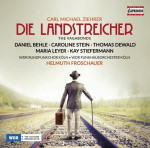|
Back
02/21/2016
Carl Michael Ziehrer: Die Landstreicher
Daniel Behle (Roland), Thomas DeWald (August Fliederbusch), Maria Leyer (Berta Fliederbusch), Karl Fäth (Gratwohl), Anneli Pfeffer (Anna Gratwohl), Boris Leisenheimer (Rudi von Muggenheim), Dominik Wortig (Mucki von Rodenstein), Caroline Stein (Mimi Cagliari), Kay Stiefermann (Kampel), Espen Fegran (Prince Adolar Gilka), Arndt Schumacher (Leitgeb), WDR Cologne Radio Choir and Orchestra, Philipp Ahmann (Chorus Master), Helmuth Froschauer (Conductor)
Recording: WDR, Klaus-von-Bismarck, Cologne, Germany (February 20-28, 2008) – 56’
Capriccio # C5261 (Distributed by Naxos of America) – Booklet in German and English

   
This effusive, highly predictable and melodic operetta à l’Autriche in two acts with prologue aptly describes Carl Ziehrer’s endearing Die Landstreicher. Though Ziehrer continually competed for public affection alongside the preeminent Johann Strauss II, it wasn’t until July 29, 1899 that he achieved his first major triumph with this work, ironically the same year Johann Strauss II died.
Son of a hatter, Carl Ziehrer was seen as a bridge between the ‘Golden Age’ and ‘Silver Age’ of operetta. While strong vestiges of the Strauss dynasty abound, they’re clear reflections of Karl Millöcker’s Der Bettelstudent (Read here), Franz Lehár’s assorted works including anticipations of Leo Fall and, in particular, Ralph Benatzky’s In the White Horse Inn (Read here).
The German title, Die Landstreicher literally translates to The Vagabonds, a husband and wife duo, August and Berta Fliederbusch (Thomas DeWald and Maria Leyer, respectively), who do just that: wander about Upper Bavaria until they chance upon a pearl necklace and a 1,000 mark note. Ziehrer’s springy music zips along with help of a Leopold Krenn/Carl Lindau absurd, poetic text.
Capriccio’s voice collection cleanly captures the plethora of characters and subplots which quickly unfold upon the conclusion of Helmuth Froschauer’s punctuated “Overture.” No time is wasted moving through the score for all voluminous sprechen is extracted (compare to the two hour long Hugo Weiner 1937 television version.)
Daniel Behle’s Roland gets a muzzy handle around the legal issues through his buttery and rounded tenor delivery. His amour, Anna Gratwohl (Anneli Pfeffer), has amiable effervescence and pliability. In concert with the WDR Radio Choir they delightfully begin to spin Act I to a close with the Tyroleanesque “Sie gepriesen, du lauschige Nacht” (contrast Behle to a more richly hued Hermann Prey) that features Pfeffer’s sustained penultimate high B-Flat, later reaching to a high C. Exceptionally difficult, yet exceptionally perfect.
The other occasionally performed stand-alone selection, the “March Duet” features lieutenants, Rudi von Muggenheim and Mucki von Rodenstein here sung by Boris Leisenheimer and Dominik Wortig, respectively. And while both singers overarch with perky militaristic diction, the tone seems a tad hollow. Singer and dancer, Mimi Cagliari, as performed by Caroline Stein is pleasant enough but nothing overly eventful during the blink-of-an-eye castanet-accompanied “Auf der Sierra.”
Because Die Landstreicher surrounds itself by so many pseudo identities and character switches, it’s incumbent to have as much clarification spelled out in the synopsis. Capriccio misses the important point of indexing track numbers within the storyline. It’s difficult and tedious to grasp all the details and make total sense of this obscure work. A German/English libretto would certainly help.
With exception to one other recording by Historische Tondokumente (featuring the delightful Anneliese Rothenberger), this Capriccio recording becomes a sufficiently rarified diamond in the ruff. With so much effort going into this venture, it’s a shame the recording didn’t take a few extra steps thereby classifying this as an ultimate treasure. Set aside operetta microscopy...simply enjoy Carl Ziehrer’s musical backdrop for what it is.
Christie Grimstad
|